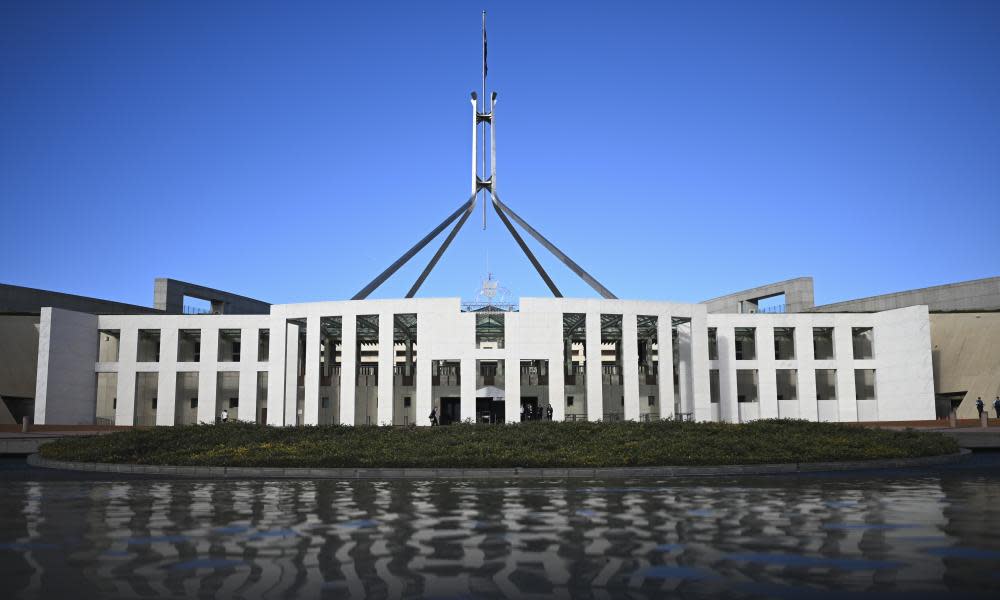Law Council urges parliament to pull back Australia's broad counter-terrorism powers

Parliament is facing calls to wind back some of the most restrictive aspects of Australia’s counter-terrorism laws, including the Abbott-era power to ban travel to conflict zones such as in Syria and Iraq.
The Law Council of Australia said it was concerned the offences of travelling or remaining in zones listed by the government were “so broadly framed they inadvertently capture a wide range of conduct and are overly reliant on law enforcement and prosecutorial discretion”.
Related: Asio boss denies expanded powers could be used to target Black Lives Matter protesters
It also branded preventative detention – which allows police to detain people if a terrorist attack “could” occur within the next 14 days – as “a highly extraordinary measure” and said subjecting 16-year-olds to it might breach Australia’s obligations under the United Nations convention on the rights of the child.
Parliament’s powerful security and intelligence committee has begun inquiring whether to renew a range of powers that are due to expire next year. The powers include the ban on travel to conflict zones, preventative detention and control orders.
Separately, the committee is considering a government bill to expand some of Asio’s powers, including lowering the minimum age for compulsory questioning to 14 if that person poses a direct threat of committing terrorism, and allowing the agency to quiz adults over foreign interference and espionage.
The end result is that a wide range of Australia’s terrorism-related powers are facing fresh scrutiny, with the dean of law at the University of New South Wales, George Williams, telling Guardian Australia that the pattern since the 2001 terrorist attacks was “a steady increase and ratcheting up of these powers in what typically is a one-way street without any sense of what the endgame is”.
Pauline Wright, the president of the law council, said sunset clauses were a valuable tool to ensure that extraordinary laws were reviewed periodically and did not remain on the statute books for longer than necessary.
“It is crucial that every proposal for a new or an expanded power is supported by clear evidence of the threat,” she told Guardian Australia.
Under provisions first introduced when Tony Abbott was prime minister, Australian citizens, residents or visa holders can be jailed for up to 10 years if they enter, or remain in, an area in a foreign country subject to bans.
The law gives the foreign affairs minister the power to ban particular areas “if he or she is satisfied that a listed terrorist organisation is engaging in a hostile activity” in that location.
The declaration of Mosul district in Iraq, which was first listed as a no-go zone in March 2015, was revoked in December last year, while al-Raqqa province in Syria was subject to bans from late 2014 to late 2017.
But the overarching laws allowing the foreign minister the broad powers to criminalise travel to particular zones remain on the books and are due to expire in September 2021 unless parliament votes to extend them, like it did in 2018.
Wright called on parliament to be cautious before making any decision to renew the declared area regime, saying it should assess whether it was necessary and proportionate in the current security environment.
She said the law council did not support the renewal of these broadly worded powers two years ago and remained concerned people accused of breaching them may have to rely on discretion by law enforcement and prosecutors.
The Criminal Code contains exceptions for “entering or remaining solely for legitimate purposes”, but says a defendant who wishes to rely on one of these exceptions bears an evidential burden in proving those facts.
The exceptions include providing humanitarian aid, making a bona fide visit to a family member, performing an official duty for the commonwealth, serving in the arms forces of a foreign country where that performance is not in violation of Australian laws, or working in a professional capacity as a journalist.
Wright also weighed in on two other issues up for review, saying the Law Council remained of the view control orders and preventative detention orders “should not remain in force, unless highly compelling evidence to the contrary is presented”.
“Rather than detaining people or imposing significant limitations on their movements in the community for the purposes of prevention and disruption, persons of security concern should instead be subject to surveillance and when thresholds of criminality are met, they could then be charged with terrorism or other security offences,” she said.
Wright said any laws that limited the liberty of children “should be viewed with the utmost caution”.
Control orders can last up to one year, or three months in the case of people aged between 14 and 18. They can impose limits on people’s freedom, including requiring them to wear a tracking device, remain at a specified premises for up to 12 hours each day, report to someone at set times, and not communicate with certain people.
Under the current rules, Australian federal police must apply to a court if they wish to issue a control order against someone. It doesn’t necessarily require the person to have been convicted of an offence: they can be subjected to one “if it substantially helps prevent a terrorist attack”.

 Yahoo News
Yahoo News 
